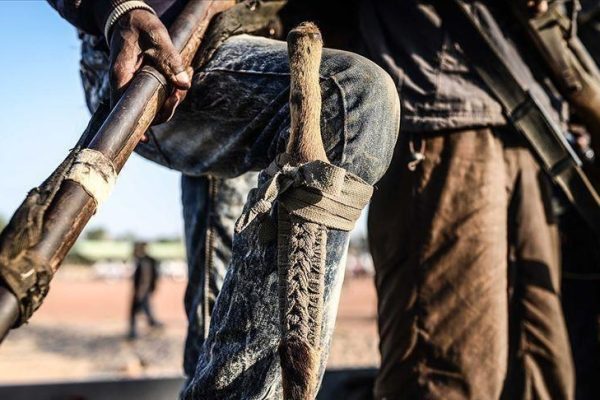- Nigeria launches new counter-terrorism strategy amid growing insecurity
- ASUU NEC meets Wednesday after government concludes renegotiation
- Nigerian market falls as decliners outnumber gainers
- Nigeria on the verge of closing funding gap in fight against gender-based violence
- GRV urges the government to allow citizens to own guns for self-defense
Across Nigeria’s 36 states and the Federal Capital Territory, these are the top five Nigerian news stories you shouldn’t miss.
Nigeria launches new counter-terrorism strategy amid growing insecurity

Nigeria has launched its Counter Terrorism Strategic Plan 2025–2030 as the country confronts escalating kidnappings, banditry and persistent threats from Boko Haram and ISWAP. The document was unveiled on Monday in Abuja by Senate President Godswill Akpabio.
Akpabio said the plan represents a renewed national resolve to protect citizens, noting that insecurity has forced investors out, shut schools and disrupted farming. He argued that while the National Assembly has strengthened defence and intelligence laws, legislation alone cannot deliver safety.
He stressed that absolute security requires investment in manpower, technology and partnerships, and must involve citizens, traditional institutions, the private sector and international allies.
ASUU NEC meets on Wednesday after government concludes renegotiation

The Academic Staff Union of Universities (ASUU) will hold a National Executive Council meeting on Wednesday to decide its next move after the Federal Government’s renegotiation team, led by Yayale Ahmed, wrapped up fresh talks with the union.
A senior ASUU NEC member said discussions resumed on Monday and will formally end on Tuesday, after which the union will review the outcome and announce its decision.
ASUU’s one-month ultimatum expired on Saturday, raising fears of another nationwide university strike. The union maintains that the government has shown a “nonchalant” approach to resolving its long-standing demands.
Nigerian market falls as decliners outnumber gainers

Trading on the Nigerian Exchange closed lower, with 27 stocks dragging the market into negative territory. Capitalisation dropped to ₦91.346 trillion, wiping off ₦68 billion, while the All-Share Index fell to 143,614.61. Market breadth also remained weak with more losers than risers.
Notable declines came from FG152028S1, NPF Microfinance Bank, Prestige Assurance, Sterling Nigeria and WAPIC Insurance. A few stocks, including Etranzact and International Energy Insurance, posted gains.
Investors exchanged 694.8 million shares worth ₦28.7 billion in 24,041 deals, with Guaranty Trust Holding Company leading both volume and value.
Nigeria on the verge of closing funding gap in fight against gender-based violence

Nigeria is planning a dedicated emergency fund to improve prevention and support services for survivors of gender-based violence. The minister of women’s affairs, Imaan Sulaiman-Ibrahim, said the move was urgent, as current funding is less than 0.5% of the national budget.
Rising attacks, low conviction rates and weak enforcement of existing laws were highlighted as key concerns. The government aims to expand safe spaces, strengthen justice systems, and raise conviction rates from 5% to 25% by 2026.
International partners, including UN Women and Women for Women International, stressed the need for stronger legal action, greater community awareness, and greater support for survivors.
GRV urges the government to allow citizens to own guns for self-defense

Gbadebo Rhodes-Vivour says Nigeria should begin licensing firearms so citizens can protect themselves from terrorists. The former Lagos Labour Party candidate, now with the African Democratic Party, argued that government failures have left people exposed as insecurity spreads beyond the north.
He pointed to recent abductions in Kwara and Ogun as proof that violence is becoming widespread and that public trust in authorities is fading. According to him, if the state cannot provide safety, Nigerians should be allowed to defend themselves.
His comments come in the middle of the recent attacks on schools and worship centres, with many citizens seeking lasting security solutions.














